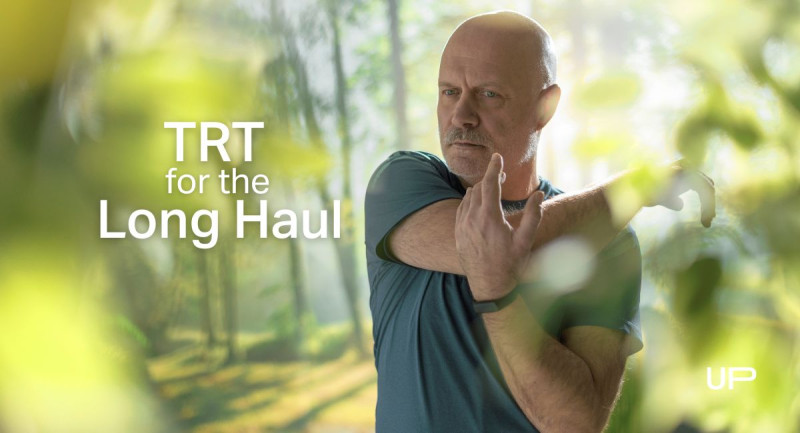Long-Term TRT After 50: How To Stay Healthy And Balanced


Starting testosterone replacement therapy (TRT) in Canada can be life-changing—but what happens when you’ve been on it for five, ten, or even fifteen years? For many men over 50, the question isn’t just whether TRT works—it’s whether it can continue to support health, vitality, and quality of life as they age.

The good news? With the right medical supervision, consistent monitoring, and smart lifestyle choices, long-term TRT can be a safe and sustainable part of your wellness strategy. This article explores what men in their 50s and 60s should know about staying on TRT for the long haul: what to track, how to stay healthy, and why hormone balance doesn’t have to be a short-term fix—it can be part of aging well in Canada.
Topics covered in this article:
What to Expect on TRT in Your 50s and 60s
As men move into their 50s and 60s, testosterone replacement therapy (TRT) often becomes less about symptom reversal and more about long-term maintenance. Unlike the initial phase of TRT—when energy, libido, and mood often bounce back dramatically—the later years are about sustaining those gains and adapting to the natural aging process with hormonal support.

Here’s what men in Canada can expect during this phase:
- Stable hormone levels: With consistent monitoring and dosing, testosterone levels typically remain within a healthy, functional range—reducing fluctuations that could affect mood or energy.
- Fewer dramatic shifts: Most men no longer experience the “new TRT boost.” Instead, the benefits are more subtle and steady, like improved resilience, mental sharpness, and better recovery.
- Ongoing health responsibilities: Long-term TRT users need to stay on top of routine bloodwork and annual health checks to monitor cholesterol, red blood cell count, and prostate-specific antigen (PSA).
- Adaptation to age-related changes: Even with TRT, natural aging continues. You may need to tweak dosage, optimize sleep and nutrition, and adjust your exercise routine to maintain the best results.
Testosterone therapy in Canada is designed for long-term health—not just short-term fixes. Knowing what to expect helps set realistic goals and keeps you engaged in your care as you move confidently through midlife and beyond.
Health Markers to Monitor Over Time
Staying healthy on testosterone replacement therapy (TRT) in your 50s and 60s isn’t just about how you feel—it’s about what your labs and checkups reveal over time. In Canada, responsible TRT means regular monitoring of key health markers to ensure that the treatment continues to be both safe and effective.
Here are the top markers every long-term TRT user should track:
- Prostate health: While TRT doesn’t cause prostate cancer, it can affect PSA (prostate-specific antigen) levels. Regular PSA tests help your provider detect any unusual changes early.
- Blood counts: TRT can increase red blood cell production, which may lead to elevated hematocrit levels. Left unchecked, this can thicken the blood and raise the risk of clotting. Routine blood tests help prevent complications.
- Lipid profile: Testosterone can influence cholesterol. Monitoring HDL (good cholesterol), LDL (bad cholesterol), and triglycerides ensures your heart health stays in check.
- Bone density: Aging men are at higher risk of osteoporosis, especially with low T. Long-term TRT may protect bone mass, but bone density scans (DEXA) help track progress and catch early signs of weakness.
- Liver and kidney function: These tests are usually stable with TRT but are included in blood panels to catch any unrelated changes early.
In Canada, clinics that offer TRT responsibly will schedule these tests at regular intervals. Think of it not as red tape, but as a roadmap to staying strong, safe, and sharp well into your later years.
Mental & Emotional Well-Being
While many men begin testosterone replacement therapy (TRT) in Canada to improve physical symptoms like low energy or reduced libido, long-term users often discover that one of the biggest benefits is mental. As you move into your 50s and 60s, sustaining emotional balance, motivation, and mental clarity becomes just as important as physical strength—and TRT can play a valuable role in that equation.
Here’s how:
- Mood stability: Testosterone influences neurotransmitters like dopamine and serotonin. When balanced, it can help reduce irritability, emotional flatness, or low-grade depression that sometimes creeps in with age.
- Cognitive sharpness: Though TRT isn’t a treatment for dementia, some studies suggest it may support memory, processing speed, and overall mental sharpness in aging men with low T.
- Motivation and confidence: A healthy testosterone level often boosts drive—both professionally and personally. This can help men in midlife stay socially engaged, pursue hobbies, and maintain a strong sense of purpose.
- Stress resilience: Many men on long-term TRT report better stress management and fewer emotional crashes during high-pressure periods, which is especially important during career transitions or retirement planning.
Of course, TRT is not a substitute for therapy, social connection, or healthy coping strategies. But when monitored properly, testosterone therapy in Canada can be part of a larger toolkit that helps you stay focused, upbeat, and mentally energized well into your later decades.

Lifestyle Synergy
In your 50s and 60s, testosterone replacement therapy (TRT) is only part of the equation. While TRT can help balance hormones and restore what age has gradually worn down, your daily habits ultimately determine how well you sustain those gains. In fact, as you get older, the synergy between lifestyle and TRT becomes more important—not less.
Here’s why:
- Exercise amplifies results: Resistance training and regular cardio not only maintain muscle mass and heart health, but they also help your body respond better to TRT. Staying active keeps metabolism high and prevents weight gain, which can suppress testosterone levels.
- Nutrition supports hormone stability: Eating enough protein, healthy fats, and micronutrients like zinc and vitamin D fuels both natural testosterone production and your body’s ability to use TRT effectively.
- Sleep and recovery are critical: Poor sleep disrupts hormone regulation and recovery. Prioritizing 7–8 hours per night helps you maintain energy, libido, and cognitive sharpness.
- Stress management preserves balance: Chronic stress increases cortisol, which can counteract the benefits of TRT. Practices like meditation, therapy, or even regular downtime support both mood and hormone balance.
Long-term TRT in Canada is most effective when it's part of a broader health strategy—not a solo act. If you want to feel strong, sharp, and connected well into your 60s and beyond, aligning your habits with your therapy is non-negotiable.
Avoiding Pitfalls
Long-term testosterone replacement therapy (TRT) can be safe and beneficial—but only if it’s done right. As men in Canada move through their 50s and 60s on TRT, the risks shift from side effects to mismanagement. The most common issues aren’t caused by the therapy itself, but by how it’s used—or neglected.
Here are the key pitfalls to watch for:
- Overuse or “stacking”: Some men push beyond prescribed doses hoping for faster or greater results. This can lead to excessive red blood cell production, hormone imbalances, or even emotional volatility. More isn’t better—it’s risky.
- Skipping checkups: As symptoms stabilize, it can be tempting to skip labs or clinic visits. But long-term TRT requires regular bloodwork to monitor prostate health, hematocrit levels, and liver function. Neglecting this puts your safety at risk.
- Ignoring lifestyle: Relying on TRT alone while neglecting diet, movement, or sleep will limit your progress. Hormones support your body—but habits shape how far you can go.
- Unrealistic expectations: TRT doesn’t stop aging—it supports healthy aging. If you expect to feel 25 again or gain muscle without effort, you’re setting yourself up for frustration.
In Canada, legitimate TRT providers prioritize education and monitoring—not just prescriptions. Avoiding these traps means being informed, consistent, and proactive. That’s what turns hormone therapy into a long-term health strategy—not a short-term experiment.

Aging Actively – What Long-Term TRT Users Are Experiencing
For men considering testosterone replacement therapy (TRT) well into their 50s and 60s, long-term outcomes matter. Fortunately, growing clinical evidence and patient data from Canada and globally show that TRT can be a sustainable part of healthy aging—when paired with proper medical supervision.
Long-term users often report:
- Stable energy and motivation maintained over time
- Preserved muscle mass and strength, especially when combined with resistance training
- Improved mood and cognitive sharpness, contributing to better quality of life
- Sexual health and libido that remain consistent or improve with therapy
- Normal PSA and cardiovascular markers, when monitored regularly and dosed appropriately
In properly managed settings, many men remain on TRT for 10+ years without significant complications. The key difference lies in how it’s approached: long-term success comes from consistency, follow-up care, and integrating TRT into a broader lifestyle strategy—not using it as a standalone fix.
TRT isn’t just about restoring what’s lost—it’s about maintaining what matters. With the right plan, men over 50 in Canada can continue living actively, purposefully, and confidently for years to come.
Conclusion
Testosterone replacement therapy (TRT) isn’t just about turning things around in your 40s—it can be a steady companion well into your 50s, 60s, and beyond. For men in Canada committed to monitoring their health and staying active, TRT offers more than symptom relief—it provides long-term support for strength, vitality, mental clarity, and confidence.

The key is smart care: regular bloodwork, honest communication with your provider, and healthy lifestyle choices that work in sync with your hormone therapy. Aging is inevitable—but how you age is, to a large extent, in your hands.
With the right medical guidance and personal effort, TRT doesn’t just help you feel better now—it helps you show up strong for everything that matters in the years ahead. Retirement isn’t the end of the road. For many men, it’s just the start of a new, energized chapter.
Frequently Asked Questions (FAQs)
Yes, long-term TRT can be safe when properly monitored. Regular blood tests and check-ins with your healthcare provider help track key markers like PSA, hematocrit, and cholesterol to ensure therapy remains both safe and effective.
Absolutely. While the “boost” may feel more subtle over time, many men report sustained energy, mood stability, sexual health, and muscle maintenance well into their 60s and 70s—especially when combined with a healthy lifestyle.
You should regularly monitor prostate health (via PSA), red blood cell count, lipid profile, liver and kidney function, and bone density. These are typically done every 6–12 months, depending on your doctor’s recommendation.
It is possible, but not always easy. Your body may reduce its natural testosterone production while on TRT. If you’re considering stopping, consult your healthcare provider about tapering off gradually and supporting natural recovery.
Current evidence does not show increased risks of heart attacks or prostate cancer with medically supervised TRT. In fact, some studies suggest it may improve cardiovascular markers when levels are kept in the normal range.
References
UPGUYS has strict sourcing guidelines to ensure our content is accurate and current. We rely on peer-reviewed studies, academic research institutions, and medical associations. We strive to use primary sources and refrain from using tertiary references.- The benefits and risks of testosterone replacement therapy: a review, PubMed,
https://pmc.ncbi.nlm.nih.gov/articles/PMC2701485/?utm_source=chatgpt.com - Risks of testosterone replacement therapy in men, PubMed,
https://pmc.ncbi.nlm.nih.gov/articles/PMC3897047/?utm_source=chatgpt.com - Long-term effect of testosterone therapy on bone mineral density in hypogonadal men, PubMed,
https://pubmed.ncbi.nlm.nih.gov/9253305/
This article is written for informational purposes only and does not constitute medical advice. The information provided in the articles cannot and should not replace advice from a healthcare professional. Talk to your healthcare provider about any physical or mental health concerns or the risks and benefits of any treatment or medication.





